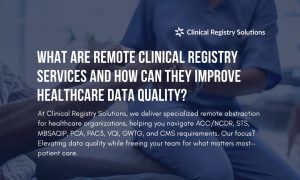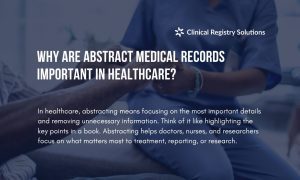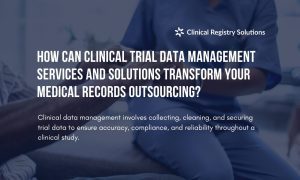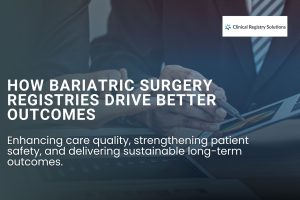Our relationship with patient data is evolving rapidly. The rise of telemedicine and remote care has created an unprecedented need for accurate and efficient medical record abstraction. But what does this mean for healthcare providers, and how is technology shaping the future of remote registry services?
At Clinical Registry Solutions, we help healthcare facilities optimize their data processes, ensuring accuracy and efficiency. In this blog, we’ll explore how medical record abstraction is changing and how remote data abstractors are driving advancements in healthcare.
What Is Medical Record Abstraction?
Medical record abstraction is the process of collecting pertinent patient data from health records, processing, and organizing it for reporting, analysis, and auditing. This information is essential to enhance patient care, ensure compliance with healthcare standards, and monitor industry trends.
Traditionally, this was done manually by in-house personnel. However, the rise of telemedicine and remote healthcare has increased demand for remote registries capable of handling large volumes of data seamlessly.
How Telemedicine Affects Medical Record Abstraction
Telemedicine has made healthcare more accessible but also complicated data handling in several ways:
- Expansion of Digital Health Records: With more online consultations, medical interactions are increasingly digital. Remote data abstractors ensure these records are properly categorized and stored.
- Requirement for Swift Data Processing: Telemedicine generates large volumes of data, requiring fast and efficient abstraction to meet patient care timelines.
- Compilation of Various Data Sources: Remote healthcare includes telehealth apps, EHRs, and smart devices. All this data must be gathered to complete comprehensive patient records.
- Adapting to Dynamic Compliance Policies: Telemedicine growth comes with evolving healthcare regulations. Remote registry services ensure compliance with laws like HIPAA.
Changes in Remote Registry Services to Meet Modern Needs
At Clinical Registry Solutions, we implement advanced strategies to handle today’s complex data demands:
Multi-Layered Security
Security protocols such as multifactor authentication and encrypted remote access protect sensitive patient data accessed remotely.
Hospitals are expanding their remote data management by partnering with specialized vendors, reducing internal resource strain.
Specialized Expertise for Consistent Accuracy
Remote abstractors trained exclusively in medical record abstraction ensure higher accuracy than general data handlers.
Integrating Wearable Technology Data
With wearable devices like smartwatches and fitness trackers becoming common, remote abstractors are tasked with interpreting this additional health data.
Pros of Remote Medical Record Abstraction
| Benefit | How It Helps |
| Cost Savings | Reduces the need for in-house abstraction teams |
| Improved Accuracy | Ensures compliance with registry guidelines |
| Faster Processing | Speeds up report submissions and compliance |
| Scalability | Easily handles increasing patient data volumes |
| Data Security | Protects patient info with encryption systems |
| Better Patient Care | Allows doctors to focus on treatment |
| Compliance Assurance | Keeps providers updated with data protection laws |
Challenges in Remote Medical Record Abstraction
| Problem | Solution |
| Data Standardization | Standardizing data from multiple sources requires manual effort |
| Cybersecurity Concerns | Use strong encryption and secure access protocols |
| Training and Knowledge | Provide continuous education on new regulations and tech |
| Costs of Technology | Partner with vendors like Clinical Registry Solutions to reduce costs |
FAQs
What does a remote data abstractor do?
They summarize and present medical histories from electronic health records to registries, ensuring accuracy and compliance.
Why is remote registry support essential for telemedicine?
It helps manage the massive data generated by telemedicine, improving patient care and regulatory compliance.
Can automation fully replace human abstractors?
No, automation speeds processes but complex cases still require human expertise.
What are the benefits of outsourcing medical record abstraction?
It reduces workload, improves accuracy, and allows healthcare staff to focus on patients.
How is patient data security ensured in remote abstraction?
By implementing strict encryption, multifactor authentication, and adhering to HIPAA and other regulations.
Conclusion
Telemedicine and remote healthcare are reshaping the future of medical record abstraction. As providers digitize their records, adopting remote registry services and automation tools becomes crucial.
With experts like Clinical Registry Solutions, remote data abstraction is accurate, efficient, and compliant. Leveraging the right technology and specialized knowledge ensures effective patient data management in the evolving landscape of healthcare.




